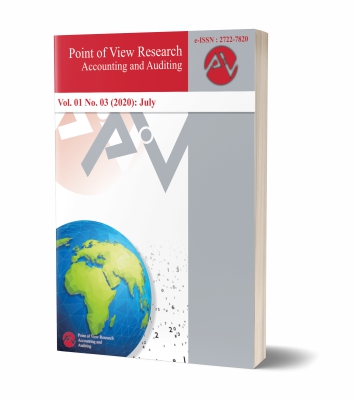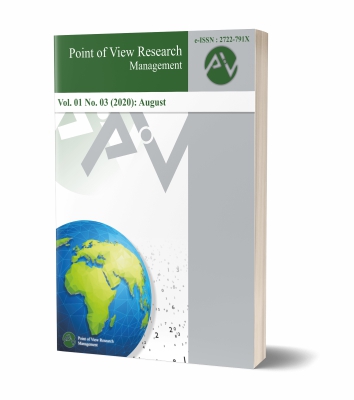Follow up on External Audit Result: Evidence from Telecommunications Companies in Indonesia
Abstract
This study aims to analyze the follow-up of external audit results at PT. Telkom Region IX, Tbk. The research method used by researchers is quantitative descriptive data collection in the form of financial statements audited by the internal auditors and external auditors in 2018 and followed up by asking opinions for informants related to financial reporting. Based on the results of an analysis of research conducted at PT. Telkom states that the audited financial statements in 2018 show the results of an opinion that is reasonable with the exception due to inconsistencies and human resources implementing multiple positions in a company's activities, which can be seen when preparing different fixed asset reports in 2017 and 2018 , so based on the problem it does not show the category of cheating because the reasons presented by the management at the time of the inspection are considered reasonable because it is only done once so that the calculation of depreciation in the following year does not repeat the mistake again, but if the following year changes the depreciation method then this is a an intentional fraud because it has been committed more than once.
Downloads
References
A. Agoes, Sukrisno.(2017). Auditing Petunjuk Praktis Pemeriksaan Oleh. Jurnal Ilmiah Mahasiswa S1 Akuntansi Universitas Pandanaran ISSN, 2502, 7697.
Albab, A. U., Nur savitri, A. S., & Anwar, S. (2019). Analisa Hasil Audit Pemerintah Terhadap Tingkat Korupsi Pemerintahan Provinsi Jawa Tengah. Accounting Global Journal, 3(2), 103–117. https://doi.org/10.24176/agj.v3i2.3587
Barbadillo, E. R., Agilar, N. G., & Barbera, C. D. F. Agoes, Sukrino.(2004). Auditing (Pemeriksaan Akuntan) Oleh Kantor Akuntan Publik. Edisi 3. Jakarta: Fakultas Ekonomi Universitas Indonesia. Accounting Review, 13(4), 597-620.
Hajering, M. S. (2019). Moderating Ethics Auditors Influence of Competence, Accountability on Audit Quality. Jurnal Akuntansi, 23(3), 468-481.
Harinurhady, A., Rifa’i, A., & Alamsyah, A. (2017). Analisis Penyelesaian Tindak Lanjut Hasil Pemeriksaan Auditor Inspektorat Kabupaten Sumbawa Barat. Jurnal Economia, 13(1), 95. https://doi.org/10.21831/economia.v13i1.13520
Hendriyani, S., & Suhendra, K. (2018). Implementasi Penyelesaian Tindak Lanjut Hasil Pengawasan Fungsional Pada Inspektorat Kabupaten Indramayu Tahun 2016. “REFORMASI: Jurnal Ilmiah Administrasi,” 3(1), 70–81. https://doi.org/10.33603/reformasi.v3i1.1793
Ishak, P. (2018). Pengaruh Independensi Auditor, Emotional Intelligence, Spiritual Intelligence Ter-hadap Perilaku Etis Auditor dan Kinerja Auditor. ATESTASI: Jurnal Ilmiah Akuntansi, 1(1), 85-98.
Kustiawan, M. (2017). Pengaruh Pengendalian Intern Dan Tindak Lanjut Temuan Audit Terhadap Kualitas Laporan Keuangan Yang Berimplikasi Terhadap Pencegahan Fraud. Jurnal Akuntansi, 20(3), 345–362. https://doi.org/10.24912/ja.v20i3.2
Liu, J., & Lin, B. (2012). Government auditing and corruption control: Evidence from China’s provin-cial panel data. China Journal of Accounting Research, 5(2), 163-186.
Lusiana, L., Djamhuri, A., & Prihatiningtias, Y. W. (2017). Analisis Penyelesaian Tindak Lanjut Hasil Pemeriksaan. Jurnal Economia, 13(2), 171. https://doi.org/10.21831/economia.v13i2.15180
Muslim, M., Pelu, A. M. F., & Mentari, K. (2018). Pengaruh Kompetensi Auditor, Tekanan Ketaatan, dan Kompleksitas Tugas Terhadap Audit Judgment. Bongaya Journal for Research in Accounting, 1(2), 8–17.
Pratiwi, A., Muslim, M., Rahim, S., & Pelu, M. F. A. R. (2020). Kualitas Audit: Ditinjau dari Fee Audit, Risiko Audit dan Skeptisme Profesional Auditor sebagai Variabel Moderating. Ekuitas: Jurnal Pendidikan Ekonomi, 8(1), 9–19.
Pratiwi, R., & Aryani, Y. A. (2017). Pengaruh Karakteristik Pemerintah Daerah, Kepala Daerah, Tindak Lanjut Temuan Audit Terhadap Opini. Jurnal Akuntansi, 20(2), 167. https://doi.org/10.24912/ja.v20i2.52
Rahim, S., Ahmad, H., Nurwakia, N., Nurfadila, N., & Muslim, M. (2020). The Influence of Audit Staff Quality and Client Type on Audit Evidence Collection with Communication Type as Moderation. Journal of Accounting and Strategic Finance, 3(1), 103–117. https://doi.org/10.33005/jasf.v3i1.79
Rosandi, R. (2009). Persepsi Mahasiswa Akuntansi Terhadap Etika Profesi Auditor Dalam Mendeteksi Kecurangan Penyajian Laporan Keuangan (Survey Pada Universitas Muhammadiyah Surakata dan Universitas Sebelas Maret) (Doctoral dissertation, Universitas Muhammadiyah Surakarta).
Sugiyono, P. D. (2010). Metode penelitian pendidikan. Pendekatan Kuantitatif.
Suraida, I. (2005). Pengaruh etika, kompetensi, pengalaman audit dan risiko audit terhadap skeptisisme profesional auditor dan ketepatan pemberian opini akuntan publik. Sosiohumaniora, 7(3), 186.
Tarigan, M. U., & Susanti, P. B. (2013). Pengaruh Kompetensi, Etika dan Fee Audit Terhadap Kualitas Audit. Jurnal Akuntansi, 13(1), 803-832.
Tresnawati, F., & Nur Apandi, R. N. (2016). Pengaruh Tindak Lanjut Hasil Pemeriksaan Terhadap Kualitas Laporan Keuangan Dengan Tingkat Pengungkapan Laporan Keuangan Sebagai Variabel Moderating (Studi Empiris Pada Kementerian/Lembaga Republik Indonesia). Jurnal ASET (Akuntansi Riset), 8(1), 1. https://doi.org/10.17509/jaset.v8i1.4017
Umar, H. (2012). Pengawasan Untuk Pemberantasan Korupsi. Jurnal Akuntansi dan auditing, 8(2), 109-122.
Wibowo, A., & Rossieta, H. (2009). Faktor-faktor determinasi kualitas audit–suatu studi dengan pen-dekatan earnings surprise benchmark. Simposium Nasional Akuntansi, 12, 1-34.
Copyright (c) 2020 Point of View Research Accounting and Auditing

This work is licensed under a Creative Commons Attribution 4.0 International License.






.png)









